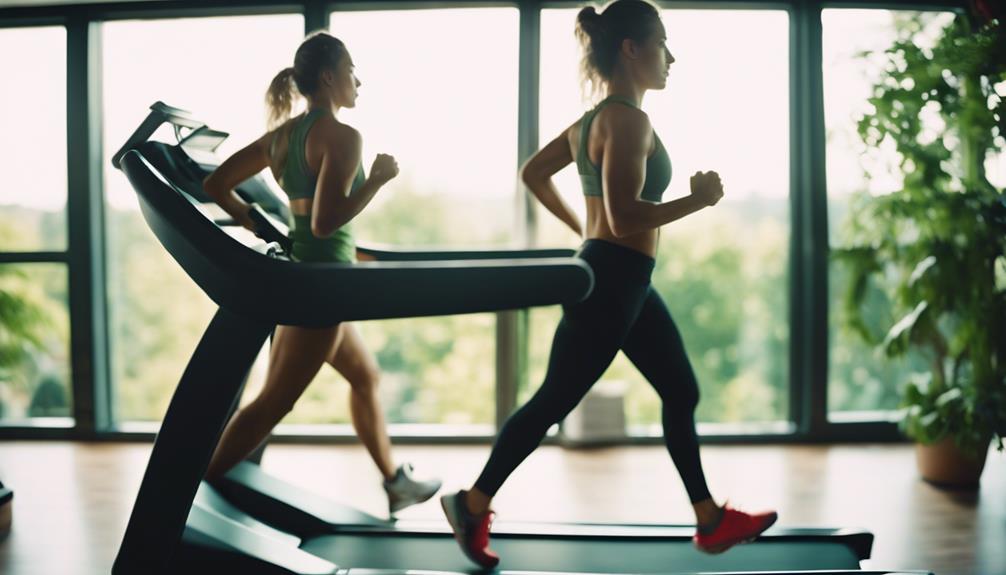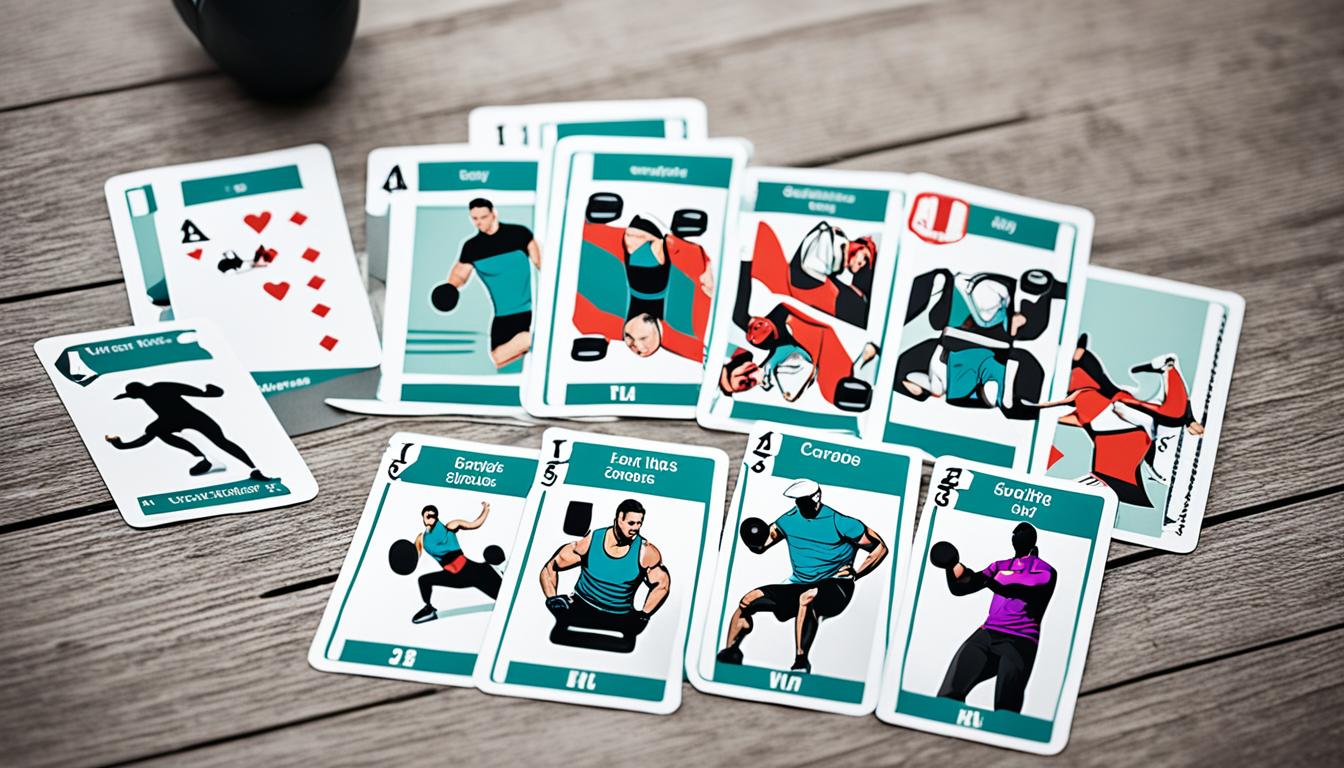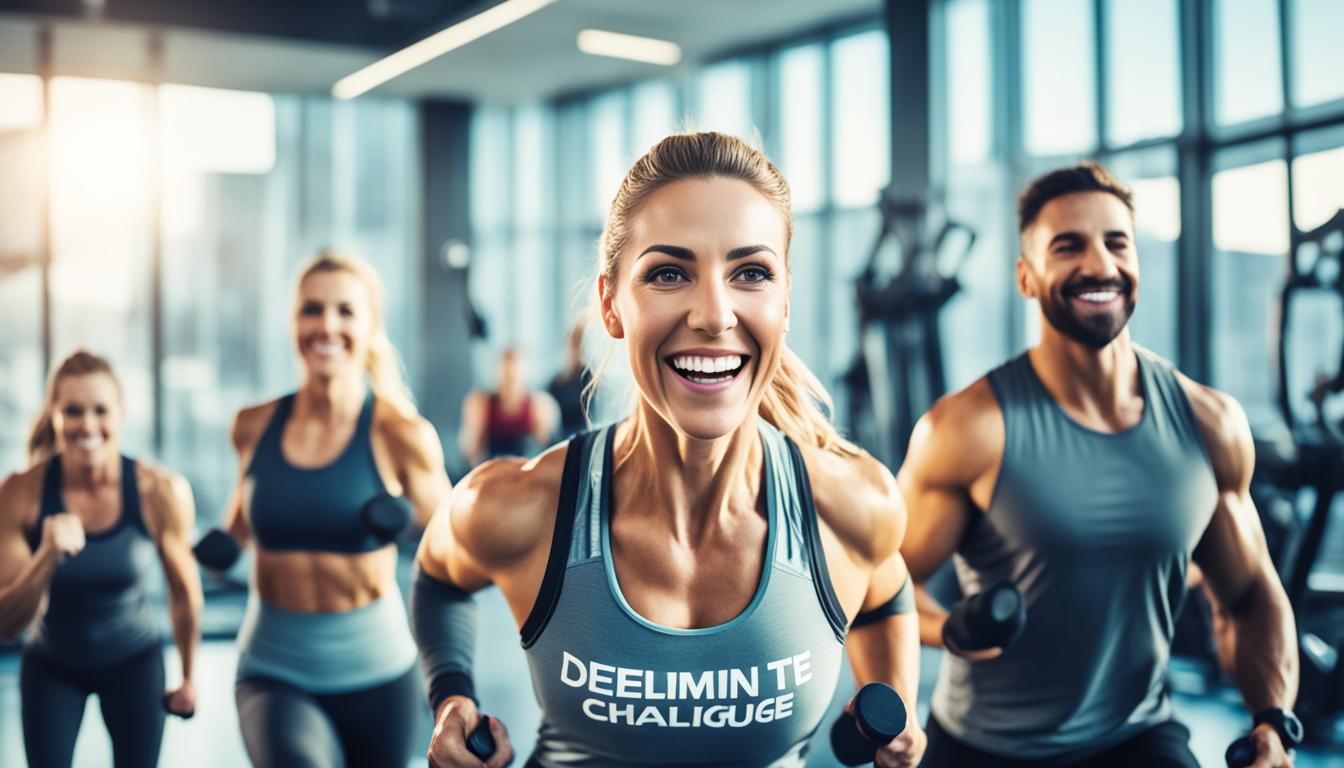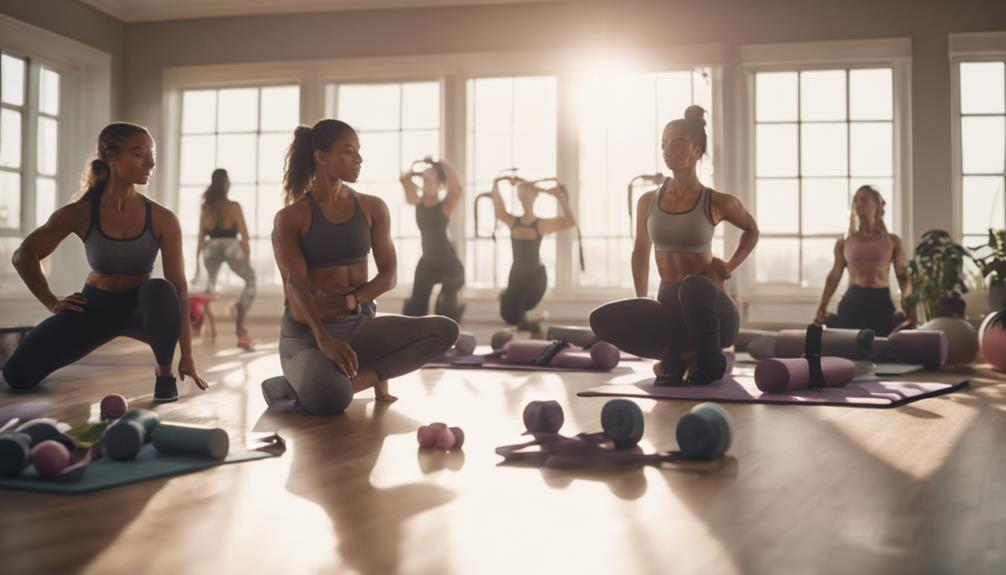You can improve your fitness with inclined treadmill workouts by increasing your calorie burn and targeting major muscle groups. Begin with a 1% to 2% incline to ease into the workout and prevent strain. Slowly raise the incline to effectively challenge your glutes, quads, and hamstrings. Aim for 2-3 sessions per week, maintaining your heart rate at 60%-80% of its maximum for optimal results. Remember to properly warm up and focus on maintaining good posture. With consistent effort, you will enhance your strength and endurance. There is much more to learn about maximizing your results and enjoying this workout!
Key Takeaways
- Begin with a warm-up for 5 minutes on a flat surface to prepare your muscles for incline workouts.
- Start with a 1% to 4% incline and gradually increase it to boost fitness and endurance.
- Aim to maintain a heart rate of 60% to 80% of your maximum for effective calorie burning.
- Incorporate the 12-3-30 workout for a simple, effective routine to improve cardiovascular fitness.
Understanding Incline Walking
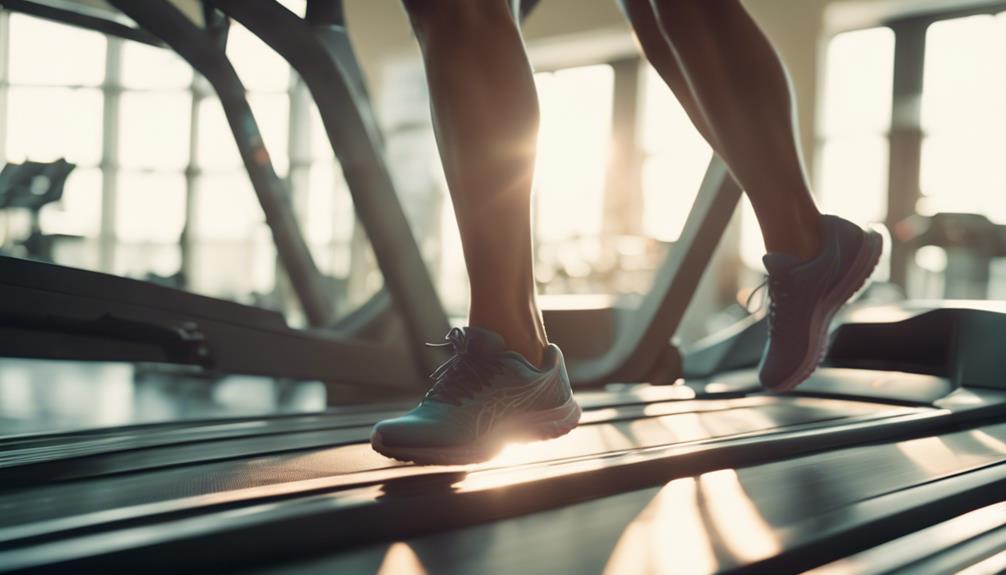
Incline walking on a treadmill boosts your workout intensity and helps you burn more calories than walking on a flat surface. This approach to incline treadmill workouts targets your glutes, quads, and hamstrings more effectively, elevating your heart rate and enhancing cardiovascular health. By adjusting the incline, you can match your fitness levels, making it a versatile option for beginners and seasoned athletes alike.
When you start walking on an incline, it's vital to maintain proper form to prevent injuries. A common mistake is beginning at too high an incline, which can lead to strain. Instead, aim for a 1% to 2% incline initially, as it mimics outdoor elevation changes and promotes gradual strength improvement. Don't skip your proper warm-up, either; it's important for preparing your muscles and reducing injury risk.
Incline workouts can increase calorie burn by up to 50% compared to flat walking, making them an effective form of low-impact cardio.
Using fitness apps to track your heart rate and progress guarantees you stay within a safe intensity range while maximizing your workout benefits.
Getting Started With Incline Workouts
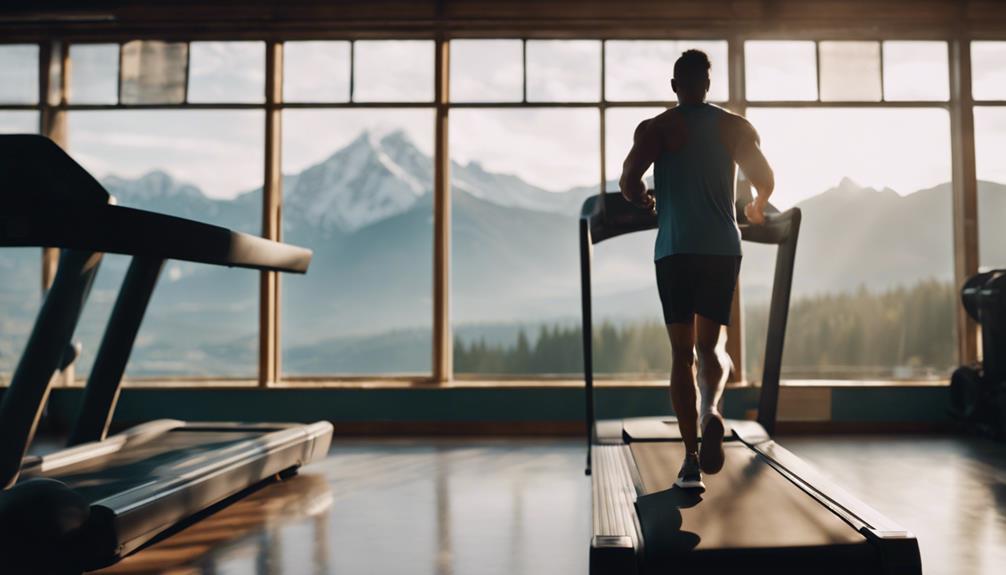
Starting incline workouts can be an exciting way to enhance your fitness routine and build strength while enjoying the benefits of a more intense cardio session.
To get started, follow these simple steps:
- Warm-Up: Begin with at least 5 minutes on a flat or slight incline. This prepares your feet, calves, and shins for the workout ahead.
- Set the Incline: Start with a 1% to 4% incline to mimic natural terrain. This helps your body adapt without overwhelming it.
- Short Sessions: Begin with 10-15 minute workouts. As you get comfortable, you can gradually increase the duration and incline.
- Monitor Your Heart Rate: Aim to stay within 60% – 80% of your maximum heart rate, ensuring you're effectively working on your cardiovascular endurance.
As you progress, remember to gradually increase the incline. This not only boosts your fitness level but also enhances endurance, making your treadmill workouts more effective.
Enjoy the journey as you challenge yourself and witness the improvements in your strength and stamina!
Safety Tips for Incline Walking
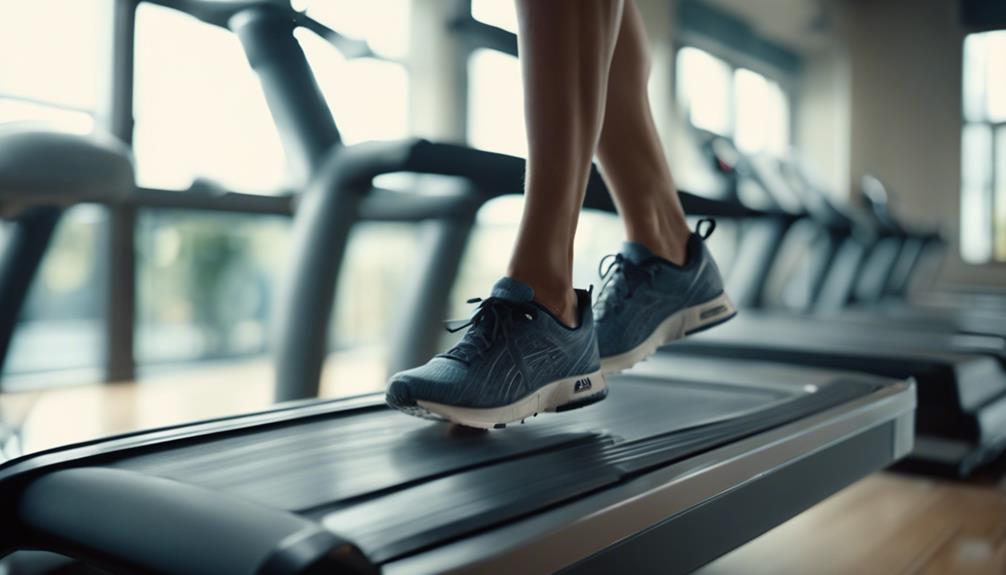
When walking on an incline, it's important to prioritize your safety to prevent injuries and enhance your workout experience. Start with a proper warm-up to prepare your feet, calves, and shins, which can help you avoid strains.
Always monitor your heart rate during incline walking workouts, aiming for 60% to 80% of your maximum heart rate to guarantee you're exercising at a safe intensity.
To reduce the risk of injury, gradually increase the incline, preferably between 2% and 7%. This range can elevate your heart rate without putting excessive pressure on your joints.
Maintaining proper posture is key; keep your back straight and shoulders relaxed to avoid straining your lower back, hamstrings, and knees.
It's also wise to limit treadmill workouts to every other day. This allows your body to recover, helping you avoid overuse injuries like tendonitis or shin splints.
Advanced Incline Techniques
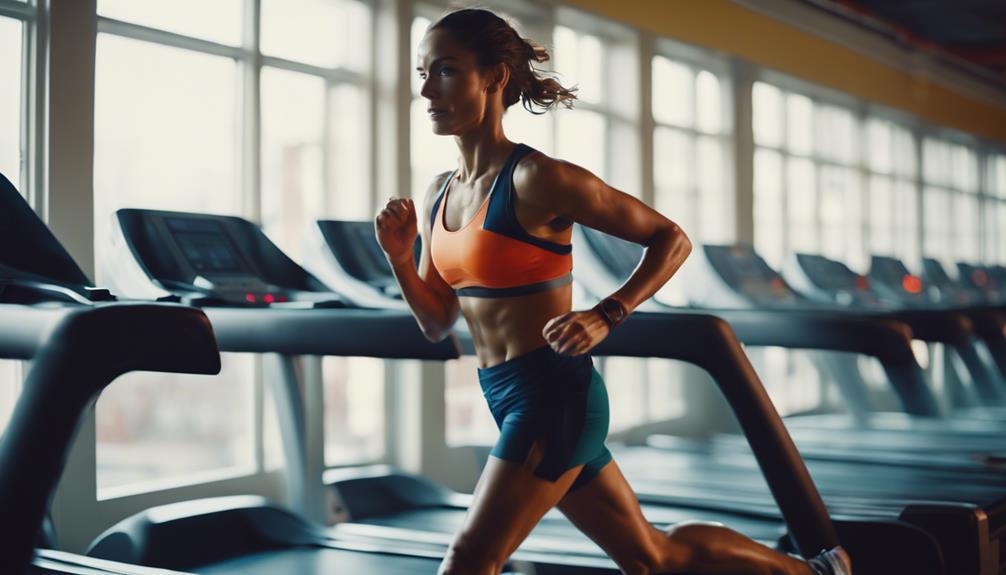
For those looking to elevate their workouts, advanced incline techniques can greatly enhance your fitness routine and target key muscle groups. By incorporating these methods into your incline treadmill walking, you'll not only boost calorie burning but also improve your lower body strength.
Here are four advanced techniques to contemplate:
- Increase the Incline: Gradually work up to a 10% incline to intensify your workouts and effectively target your leg muscles, including glutes, quads, and hamstrings.
- Interval Training: Alternate between high and low inclines. This helps maintain a challenging pace while enhancing cardiovascular health.
- Maintain Proper Form: Keep your back straight and engage your core to prevent injury and maximize efficiency during your workouts.
- Monitor Your Heart Rate: Verify you're staying within your target heart rate zone to meet your fitness goals safely.
The 12-3-30 Workout Explained
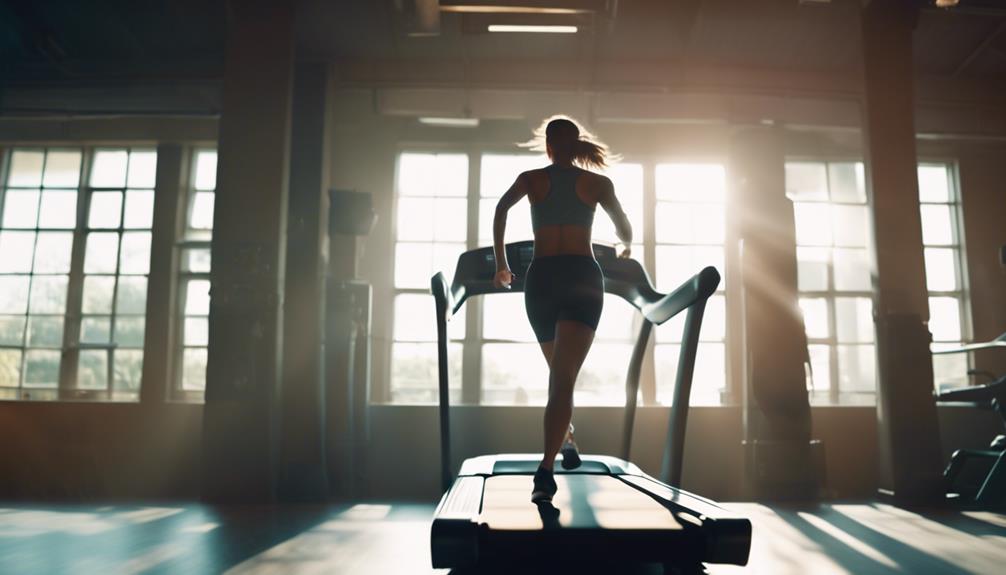
Building on advanced incline techniques, the 12-3-30 workout offers a straightforward yet effective approach to enhance your treadmill routine. This popular workout, made famous by influencer Lauren Giraldo, involves walking at a 12% incline on the treadmill, at a speed of 3 mph, for 30 minutes. It's designed to improve cardiovascular fitness, increase endurance, and facilitate weight loss, with many participants reporting significant weight loss results.
The low-impact nature of this workout makes it suitable for all fitness levels, allowing anyone to incorporate it into their routine without fear of injury. Plus, its simple workout routine emphasizes accessibility, making it a fantastic option if you're new to exercising or want to avoid complicated gym workouts.
| Feature | Details |
|---|---|
| Incline | 12% |
| Speed | 3 mph |
| Duration | 30 minutes |
| Frequency | 2-3 times per week |
Health Benefits of Incline Walking
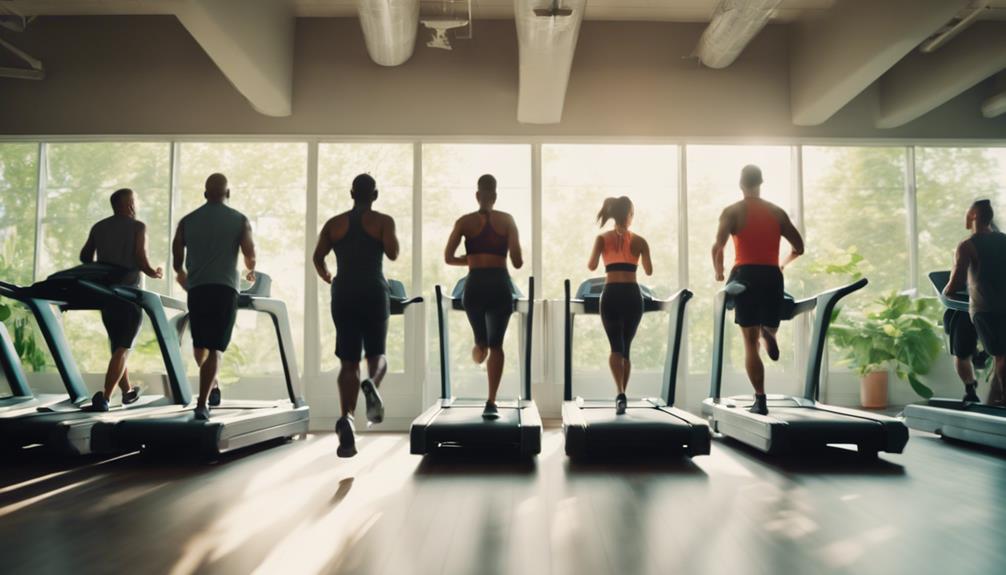
Incline walking offers some standout health benefits that can really boost your fitness routine.
Not only does it improve your cardiovascular health by getting your heart rate up, but it also engages multiple muscle groups, making your lower body stronger.
Cardiovascular Health Improvement
Walking on an incline boosts your heart rate, enhancing cardiovascular endurance and promoting better heart health. This effective incline workout not only provides a solid cardiovascular challenge but also offers several health benefits:
- Improved Circulation: Regular incline walking helps lower blood pressure and enhances blood flow, reducing the risk of heart disease.
- Weight Loss: A 30-minute incline session can burn around 125 calories for a 150-pound person, making it a great addition to your weight loss plan.
- Enhanced Lung Capacity: Engaging in incline walking improves your lung efficiency, contributing to better overall respiratory health.
- Low-Impact Exercise: This form of exercise is gentle on your joints, making it an ideal choice for those with joint concerns, allowing you to stay active without excessive strain.
Enhanced Muscle Engagement
Elevating your workout with an incline engages more muscles in your lower body, leading to increased strength and tone over time. When you walk on an incline, you activate your glutes, hamstrings, quads, and calves more effectively than on a flat surface. This enhanced muscle engagement not only improves your lower body strength but also contributes to better muscle definition.
Studies show that walking at a 10% incline can greatly elevate your heart rate, enhancing your cardiovascular fitness. This means you're not just building strength; you're also boosting your endurance. The incline challenges your body to recruit more muscle fibers, making each workout more efficient.
Additionally, incline walking is a low-impact exercise, which means it reduces strain on your joints while still effectively engaging multiple muscle groups. This makes it an excellent choice for anyone, including those recovering from injuries.
Regular incline workouts can also boost your metabolism, aiding in weight loss by burning more calories than flat walking. So, if you're looking to enhance your fitness routine, integrating incline workouts can provide you with powerful benefits for both strength and cardiovascular health.
Weight Loss Potential and Guidelines
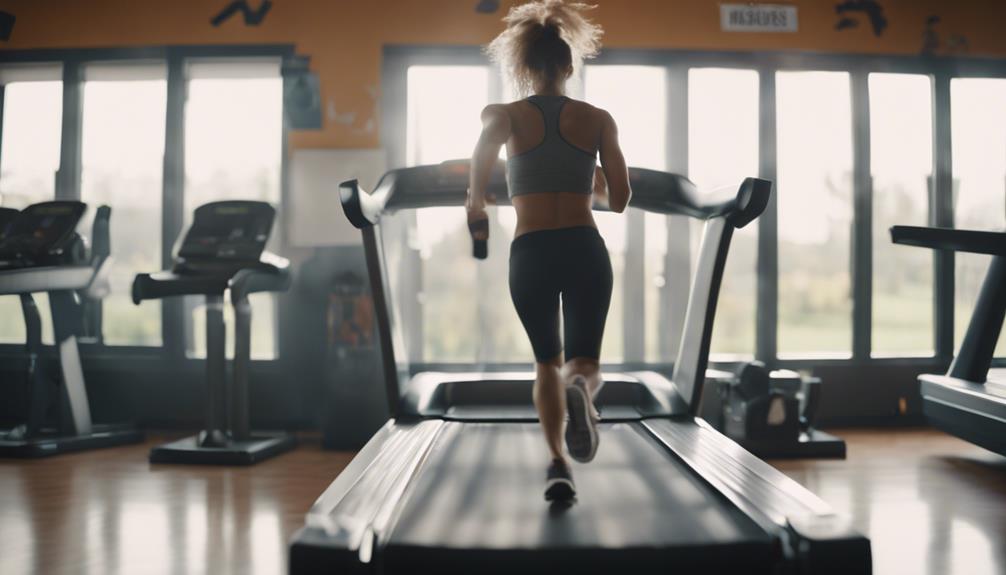
To achieve effective weight loss, aim for a gradual reduction of 1 to 2 pounds per week by creating a caloric deficit through incline treadmill workouts and dietary adjustments.
Walking uphill on an incline considerably boosts your calorie burn, helping you reach your weight loss goals faster.
Here are some guidelines to maximize your results:
- Consistency: Aim for about five incline workouts each week to maintain momentum and improve cardiovascular health.
- Start Slow: Begin with a lower incline and gradually increase it to prevent injury and adapt to the added intensity.
- Monitor Progress: Keep an eye on your heart rate during workouts to tailor your speed and incline for ideal calorie burn.
- Diet Matters: Pair your workouts with healthy eating habits to create a caloric deficit of 500 to 1,000 calories per day.
Incorporating a 12% incline can enhance your calorie burn, with a 150-pound person burning roughly 125 calories in just 30 minutes.
Muscle Engagement During Workouts
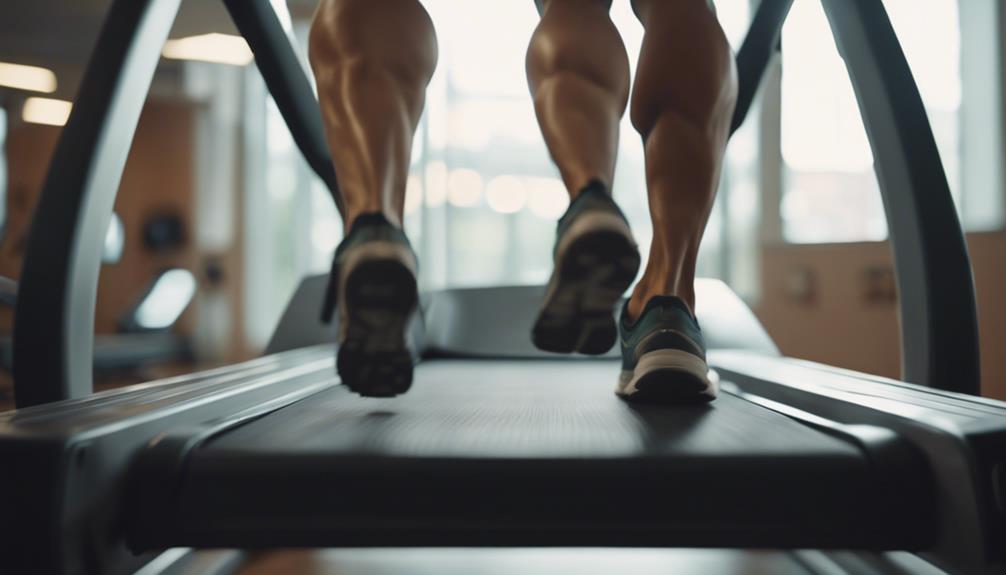
When you work out on an incline, you engage targeted muscle groups like your glutes, hamstrings, and quads, making your lower body stronger.
You also get core benefits from maintaining stability as you tackle the incline, which enhances your overall performance.
Plus, it's a low-impact exercise, so you can push yourself without straining your joints.
Targeted Muscle Groups
Inclined treadmill workouts greatly engage your glutes, hamstrings, and quads, maximizing muscle activation compared to flat surfaces. By walking at an incline, you're not just burning calories; you're also building strength and endurance in your lower body.
Here are the primary muscle groups targeted during an incline treadmill workout:
- Glutes: You'll activate and tone your glute muscles, important for a powerful stride.
- Hamstrings: These muscles play a significant role in knee flexion and hip extension, essential for running and walking.
- Quads: Strengthening your quadriceps enhances your overall leg strength, helping you tackle various physical activities.
- Calves and Shins: Incline walking effectively engages these muscles, improving your stability and balance.
This targeted muscle engagement not only leads to improved muscle tone but also enhances functional fitness, making everyday tasks easier.
With consistent incline workouts, you can expect noticeable improvements in your leg strength and overall aesthetics.
Core Engagement Benefits
Engaging your core during incline treadmill workouts not only stabilizes your body but also enhances your overall workout effectiveness. As you walk at an incline, your core engagement activates key muscles like the obliques and rectus abdominis, helping you strengthen your core while also targeting lower body muscles. This dual focus not only tones your midsection but boosts your overall health, making your workouts more efficient.
Moreover, the core muscles play a crucial role in maintaining balance and stability. When you engage them properly, you improve your performance in other fitness activities, ensuring that you're well-prepared for various challenges. Incorporating incline walking into your routine can lead to impressive gains in core endurance, as these muscles continuously work against gravity to support your movements.
Regularly including incline treadmill sessions in your workouts can greatly enhance your functional strength, making daily activities easier and more manageable. So, when you hit the treadmill, remember that focusing on core engagement won't only maximize your workout effectiveness but also contribute to a stronger, more resilient body.
Low-Impact Exercise Advantages
Low-impact exercise, like incline treadmill workouts, effectively engages multiple muscle groups while minimizing stress on your joints, making it an ideal choice for building strength and improving fitness.
Here are some key advantages of this workout:
- Muscle Engagement: Incline treadmill workouts target your glutes, hamstrings, quads, and calves, leading to thorough lower body strength development.
- Increased Calories Burned: Studies show you can burn up to 50% more calories on an incline compared to flat surfaces, aiding in weight loss.
- Reduced Injury Risk: The low-impact nature of incline walking helps reduce stress on joints, making it safer for those recovering from injuries or looking to avoid high-impact activities.
- Enhanced Cardiovascular Endurance: Regular incline workouts improve your cardiovascular endurance, boosting your stamina for daily activities.
Common Mistakes to Avoid
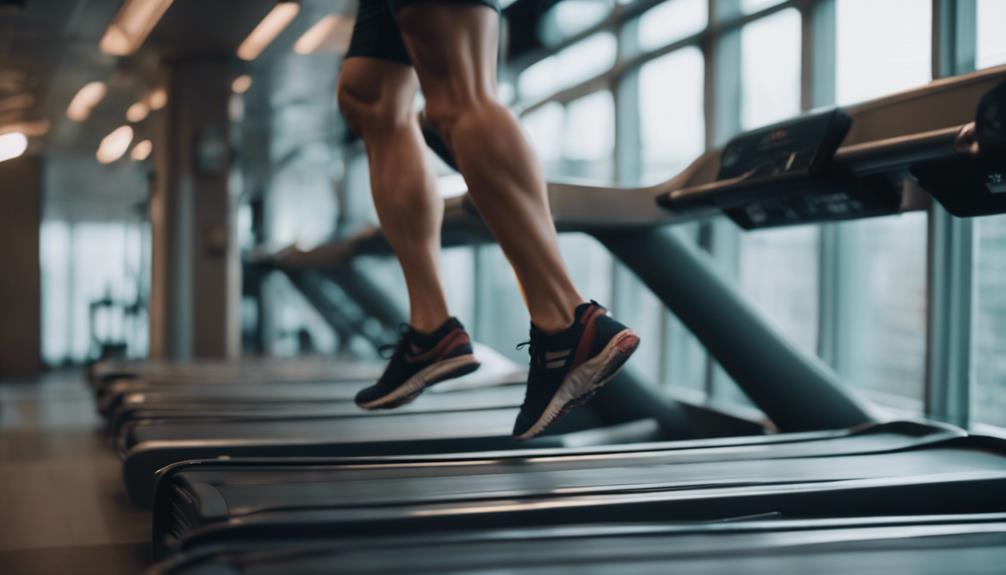
One common mistake is starting at too high an incline, which can spike your heart rate and increase the risk of injury. As a beginner, it's best to start with a 1% to 4% incline to allow your body to adapt safely.
Don't skip your warm-up, either; a 5-minute session is essential to prepare your muscles and joints for the increased intensity of your workout.
Another frequent error is maintaining poor form, like leaning forward or hunching over while walking, which can lead to back and joint issues. Keep your posture upright for better safety and effectiveness.
Additionally, be sure to monitor your heart rate throughout your workout. Striking the right balance, aiming for 60% to 80% of your max heart rate, will help you avoid undertraining or overtraining.
Tips for Long-Term Success
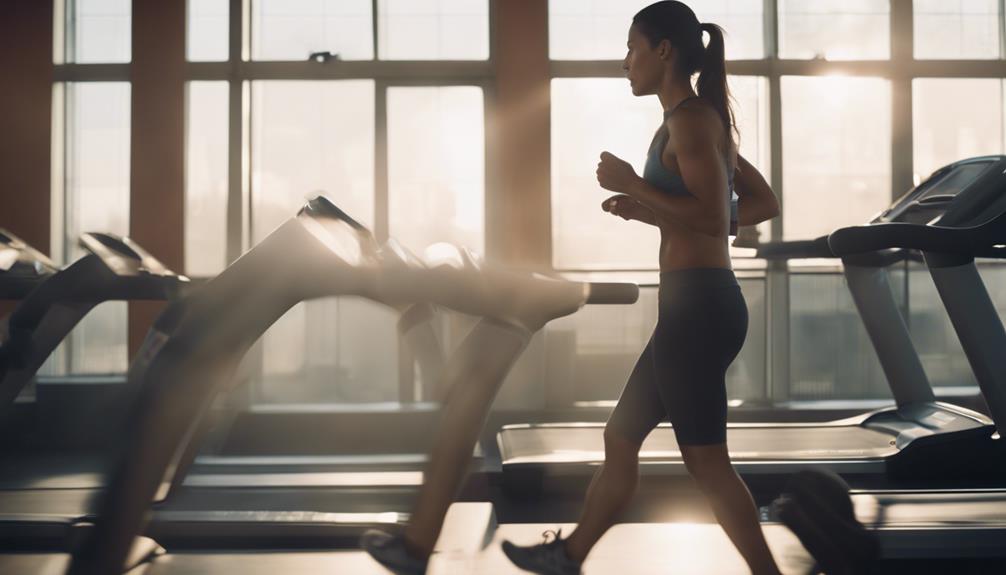
To achieve long-term success with your incline treadmill workouts, focus on building a consistent routine and gradually challenging yourself as you progress. Here are some essential tips to keep you on track:
- Be Consistent: Aim for 2-3 incline treadmill workouts per week to build endurance and strengthen your lower body muscles effectively.
- Gradually Increase Intensity: Start at a lower incline of 1-4% and increase both the incline and duration as you become more comfortable to prevent injury.
- Monitor Your Heart Rate: Keep an eye on your heart rate, aiming for 60%-80% of your maximum. This guarantees you're hitting the right intensity for effective fat burning and cardiovascular health.
- Track Your Progress: Use fitness apps or journals to monitor your progress. This helps you stay motivated and allows you to adjust your workout routine based on your personal fitness levels and goals.
Frequently Asked Questions
Does 12/3/30 Really Work?
Yes, the 12-3-30 workout can be effective for weight loss and building strength. By walking at an incline, you engage multiple muscle groups and increase calorie burn, making it a great choice for fitness enthusiasts.
How Many Calories Does the 12/3/30 Burn?
The 12-3-30 workout burns approximately 300-400 calories for someone weighing around 150 pounds. Your calorie burn varies based on weight and fitness level, but the incline greatly boosts your calorie expenditure.
Is Incline Treadmill Good to Lose Weight?
Imagine climbing a gentle hill; incline treadmill workouts are your steady path to weight loss. They boost calorie burn, engage your muscles, and reduce injury risk. You'll find it's a smart choice for your fitness journey.
What Is the 10 20 30 Workout on the Treadmill?
The 10-20-30 workout alternates between walking, moderate-paced jogging, and sprinting. You'll walk for 30 seconds, jog for 20 seconds, and sprint for 10 seconds, maximizing your cardiovascular fitness in just 30 minutes.
Are Inclined Treadmill Workouts More Effective Than Gym Workouts?
Inclined treadmill workouts offer a more intense and challenging way to burn calories compared to traditional effective gym workouts. The incline helps to engage different muscles and increase the overall intensity of the workout, leading to quicker and more noticeable results in a shorter amount of time.
Conclusion
Incorporating incline treadmill workouts into your routine can transform your fitness journey, turning every step into a powerful stride toward your goals.
As you embrace these techniques, remember, it's not just about burning calories; it's about building strength and endurance.
So, why settle for flat when you can elevate your workout?
Stay consistent, avoid common pitfalls, and watch your progress soar—because with each incline, you're not just climbing a treadmill; you're ascending to new heights of health!

